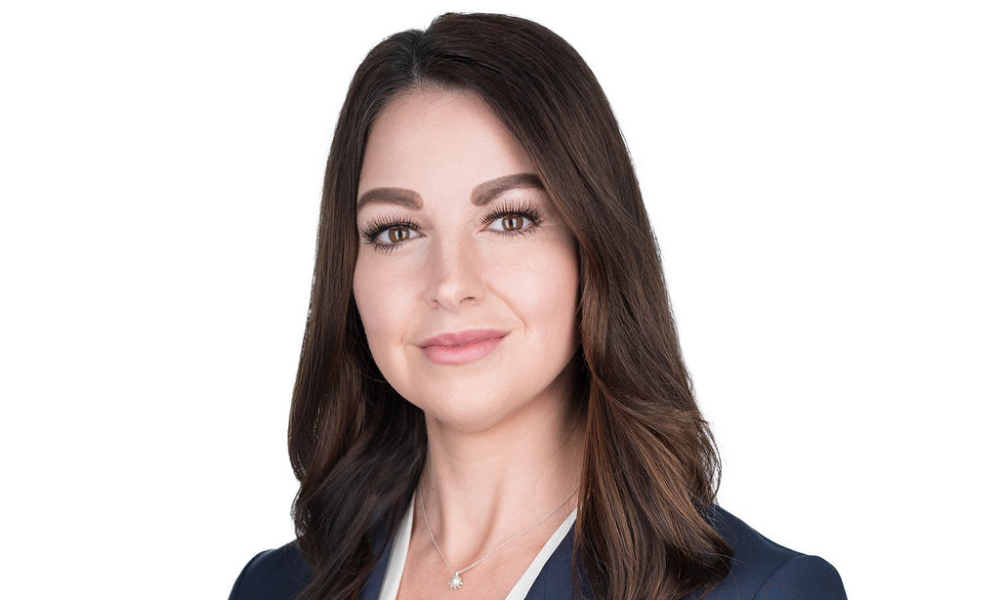Cassandra Cross explains how she’s steering women through the generational wealth transfer

With approximately $1 trillion dollars expected to pass hands by 2030, the intergenerational wealth transfer is set to drastically increase the financial stewardship responsibilities of Canadian women.
And while this prospect excites Cassandra Cross, the Calgary-based Nicola Wealth advisor suggests there is plenty of work to be done to ensure women are equipped with the financial literacy skills needed to effectively manage the funds they will be inheriting.
Many women feel a sense of imposter syndrome when they reach out to an advisor, according to Cross. She uses the example of her own family, where her father looked after all the family’s finances and her mother did not gain the financial literacy needed to be able to handle financial matters. This experience has given Cross a motivation to provide a judgement free space where women can feel comfortable discussing their financial concerns.
“It's important to address emotional barriers,” she said. “I think a lot of women, including my own mom, have this imposter syndrome, where there's this fear of getting it wrong, or this perception of not being wealthy enough, or asking silly questions. And I think that's why it's so important as an advisor that I create that safe space where they can ask questions.”
Cross says the importance of wealth planning with female clients will become increasingly important as the generational wealth transfer could potentially put women in charge of $1 trillion by 2030 through inheritance, earnings and business ownership. Bringing financial literacy skills to women who may not have had access to this knowledge is a passion of Cross, who highlights her work with Nicola Wealth to bring financial literacy workshops to women looking to improve their abilities to steward wealth.
While cases vary by the individual, Cross says she generally finds that women benefit from diversified income sources with high cash flows including businesses, real estate and dividend generating investments.
“I would say that on average, more of the women that I work with do like a cash flow focused portfolio, where you have that passive income coming in, because ultimately, cash flow gives you flexibility,” she said.
Part of the reasoning behind this cash strategy is the gender wealth gap, where women not only typically earn less, but are also more likely to take career breaks due to caregiving, whether it is raising a family or looking after aging parents according to Cross. She says women are also more likely to have lighter portfolios – which often do not have the time to compound as men’s portfolios – raising the need for passive income.
“With women, there's often career breaks … if you've taken time off work to raise a family, that can definitely lower lifetime earnings and retirement contributions,” she said. “The investment gap is just as impactful as the gender pay gap, because delayed or limited investing means smaller portfolios and fewer years of compounding over time.”
Women can often find themselves with a large sum of unexpected money through divorce or inheritance, and often have not been equipped with the tools to make the most of these finances. She says that gifting is an example where she is able to provide value by working navigating clients through potential pitfalls.
“I see it all the time with clients I work with where they're gifting to their children, and they haven't received any type of financial literacy,” she said. “A lot of my clients want to help support their children, but instead of just gifting the funds an efficient way to structure that would be through a loan. That way, in the event of a marriage breakdown, those assets that would still be tied to the child that they gave the funds to if it's structured as a loan.”
According to Cross, women are often focused on legacy-based wealth, where they are looking to leave their financial success to either good causes or to help their family.
“From my experience, women are more interested in family intergenerational planning. That is commonly brought up by a lot of the clients that I work with,” she said. “But then they also focus on value-based giving. That’s often philanthropy, charitable giving and the impact of money, what it means in terms of a legacy.”
Insurance planning is also a key component of working with female clients according to Cross, who says the marital status of her clients often guide the insurance decisions she makes with her clients.
“If it's a single woman that I'm working with I know right away that disability insurance, critical illness insurance, is very important because this is the sole income earner in the family,” she said. “So there's different planning considerations if there's single family income versus dual family income.”
Cross also enjoys working with multi generational families, a strategy she says allows her to provide financial literacy not only directly to clients, but also to the family’s future stewards. She says that by working with an entire family, she is able to smooth the sometimes-arduous process of wealth transfers, as the whole family is on the same financial page.
“We recognize that wealth without education is a huge liability, so we’re looking at equipping children and grandchildren with financial literacy, which ensures successful stewardship when there are those strategies put in place,” she said. “It's not just the investment management side, but tax planning strategies … because it's not just about how much you have or how much you make, it's how much you keep.”



